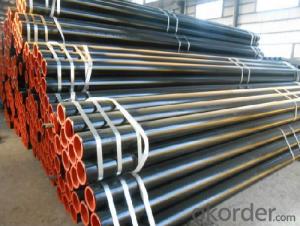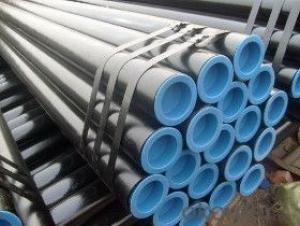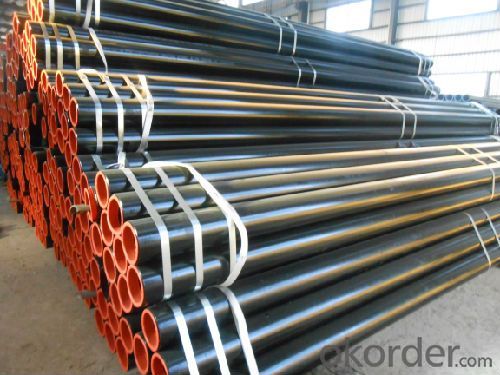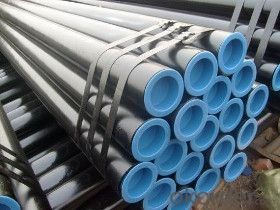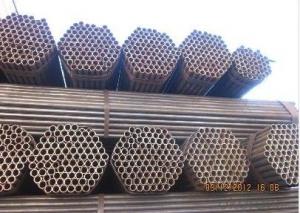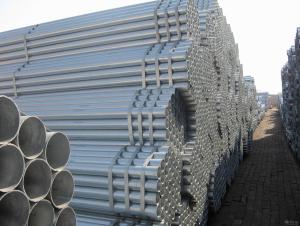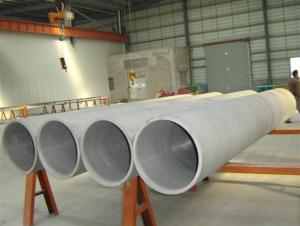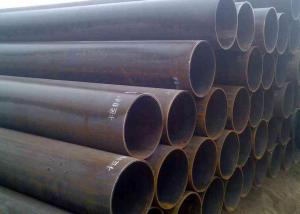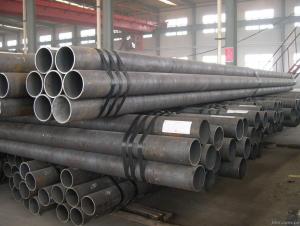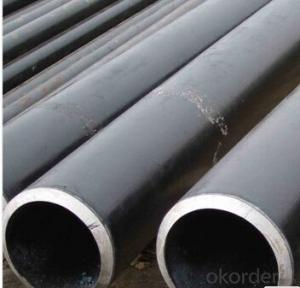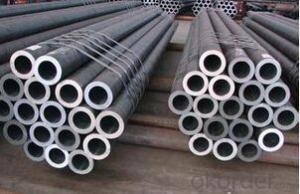Seamless Steel Tubes And Pipes for High Pressure Boiler
- Loading Port:
- Tianjin
- Payment Terms:
- TT OR LC
- Min Order Qty:
- 30 m.t.
- Supply Capability:
- 12000 m.t./month
OKorder Service Pledge
OKorder Financial Service
You Might Also Like
1、Structure of Seamless Pipe GB5310::
Seamless pipe is formed by drawing a solid billet over a piercing rod to create the hollow shell. As the manufacturing process does not include any welding, seamless pipes are perceived to be stronger and more reliable. Historically seamless pipe was regarded as withstanding pressure better than other types, and was often more easily available than welded pipe.
Standard: GB5310: Seamless Steel Tubes And Pipes for High Pressure Boiler
2、Main Features of the Seamless Pipe GB5310::
• High manufacturing accuracy
• High strength
• Small inertia resistance
• Strong heat dissipation ability
• Good visual effect
• Reasonable price
3、Seamless Pipe GB5310:Specification:
Standard | GB, DIN, ASTM ASTM A106-2006, ASTM A53-2007 |
Grade | 10#-45#, 16Mn 10#, 20#, 45#, 16Mn |
Thickness | 8 - 33 mm |
Section Shape | Round |
Outer Diameter | 133 - 219 mm |
Place of Origin | Shandong, China (Mainland) |
Secondary Or Not | Non-secondary |
Application | Hydraulic Pipe |
Technique | Cold Drawn |
Certification | API |
Surface Treatment | factory state or painted black |
Special Pipe | API Pipe |
Alloy Or Not | Non-alloy |
Length | 5-12M |
Outer Diameter | 21.3-610mm |
Grade | 20#, 45#, Q345, API J55, API K55, API L80, API N80, API P110, A53B |
Standard | ASME, ASTM |
4、Packaging & Delivery
Packaging Details: | seaworthy package,bundles wrapped with strong steel strip |
Delivery Detail: | 15-30days after received 30%TT |
5、FAQ of Seamless Pipe GB5310:
①How is the quality of your products?
Our products are manufactured strictly according to national and internaional standard, and we take a test
on every pipe before delivered out. If you want see our quality certifications and all kinds of testing report, please just ask us for it.
Guaranteed: If products’ quality don’t accord to discription as we give or the promise before you place order, we promise 100% refund.
②How about price?
Yes, we are factory and be able to give you lowest price below market one, and we have a policy that “ for saving time and absolutely honest business attitude, we quote as lowest as possible for any customer, and discount can be given according to quantity”,if you like bargain and factory price is not low enough as you think, just don’t waste your time.Please trust the quotation we would give you, it is professional one.
③Why should you chose us?
Chose happens because of quality, then price, We can give you both.Additionally, we can also offer professional products inquiry, products knowledge train(for agents), smooth goods delivery, exellent customer solution proposals.Our service formula: good quality+good price+good service=customer’s trust
SGS test is available, customer inspection before shipping is welcome, third party inspection is no problem.
6、Seamless Pipe GB5310 Images:
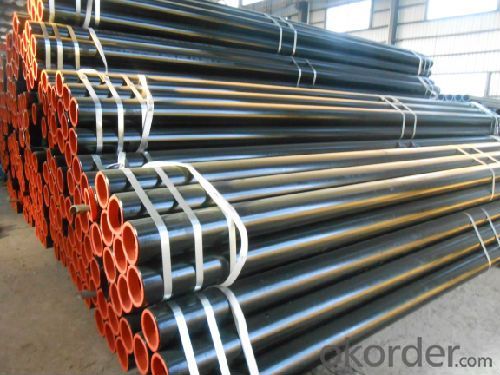
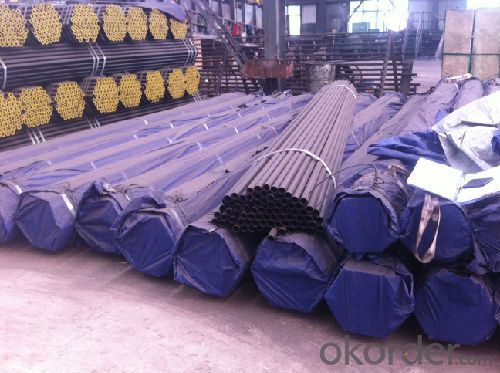
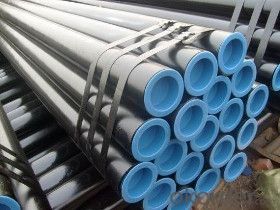
- Q: Can steel pipes be used for swimming pool installations?
- Yes, steel pipes can be used for swimming pool installations. Steel pipes are known for their durability and strength, making them a suitable choice for underground or aboveground swimming pool plumbing systems. They are capable of handling high water pressure and can withstand the corrosive effects of pool chemicals. Additionally, steel pipes are resistant to extreme weather conditions and can be easily installed and maintained. However, it is important to ensure that the steel pipes are properly treated and coated to prevent rust and corrosion.
- Q: The difference between 12Cr1MoVG alloy steel tube and 15CrMo
- With this kind of steel manufacturing products, usually by heat treatment (normalizing and tempering); parts made before use, usually need to go through refining or chemical surface treatment (carburizing and nitriding), surface quenching or high-frequency quenching treatment. Therefore, according to the chemical composition (mainly carbon content), heat treatment process and use of different, such steel can be roughly divided into carburizing, quenching and tempering and nitriding steel three.
- Q: What are the different end finishes available for steel pipes?
- There are several different end finishes available for steel pipes, depending on the specific application and requirements. Some of the most common end finishes include: 1. Plain End: This is the simplest and most common type of end finish, where the pipe ends are cut square and left plain without any additional treatment or threading. 2. Beveled End: A beveled end is an angled cut made at the end of the pipe, usually at a 30-degree angle. This allows for better welding and ensures a smooth transition between pipes. 3. Threaded End: Threaded ends are commonly used for pipes that need to be connected with other components using threaded fittings. The ends of the pipe are cut with external threads, allowing for easy assembly and disassembly. 4. Coupling End: Similar to threaded ends, coupling ends have internal threads instead of external threads. This allows for the connection of pipes using couplings or connectors. 5. Grooved End: Grooved ends are commonly used for pipes in fire protection systems or other applications that require quick and easy installation. The ends of the pipe are grooved, and then a coupling is used to connect and secure the pipes. 6. Flanged End: Flanged ends have a flat, wide surface with holes for bolts. This type of end finish is used when the pipe needs to be connected to other components using flanges, such as in piping systems or equipment connections. Each of these end finishes serves a specific purpose and is chosen based on the requirements of the application. The end finish selected will depend on factors such as the type of connection needed, the pipe's intended use, and the specific industry standards and regulations that apply.
- Q: How do you determine the maximum allowable stress for steel pipes?
- To determine the maximum allowable stress for steel pipes, several factors need to be considered. These factors include the material properties of the steel, such as yield strength and ultimate tensile strength, as well as the intended use and operating conditions of the pipes. Standards and codes such as ASME B31.3 or API 5L provide guidelines and formulas to calculate the maximum allowable stress based on these factors. Additionally, industry experts and engineers use various testing methods and simulations to ensure the safety and integrity of steel pipes under different loads and environments.
- Q: Can steel pipes be used for natural gas processing plants?
- Yes, steel pipes can be used for natural gas processing plants. Steel pipes have excellent strength and durability, making them suitable for transporting and processing natural gas. They can withstand high-pressure conditions and are resistant to corrosion, providing a safe and reliable option for gas processing facilities.
- Q: What are the different methods of joining steel pipes together?
- There are several methods of joining steel pipes together, each with its own advantages and disadvantages. 1. Welding: This is the most common and widely used method of joining steel pipes. It involves heating the ends of the pipes and applying pressure to fuse them together. Welding provides a strong and durable joint, but it requires skilled labor and specialized equipment. 2. Threaded connections: Steel pipes can also be joined by threading the ends and using threaded fittings to connect them. This method is relatively easy and quick, but it may not be as strong as welding and can be prone to leakage if not properly sealed. 3. Flanged connections: Flanges are used to connect pipes by bolting them together. This method allows for easy disassembly and reassembly, making it suitable for applications that require frequent maintenance or repair. Flanged connections are also highly resistant to leakage. 4. Compression fittings: Compression fittings are used to join steel pipes by compressing a ring or ferrule onto the pipe, creating a tight seal. This method is simple and does not require heat or welding, making it ideal for applications where heat or sparks are not permissible. 5. Grooved connections: Grooved connections involve cutting grooves into the pipe ends and using mechanical couplings to secure them together. This method is fast, reliable, and allows for easy assembly and disassembly. Grooved connections are commonly used in fire protection systems. 6. Brazing: Similar to welding, brazing involves heating the pipe ends and adding a filler material to join them together. This method is often used for smaller diameter pipes and provides a strong joint. However, it requires the use of a high-temperature torch and skilled labor. Each of these methods has its own advantages and is suitable for different applications. The choice of joining method depends on factors such as the required strength, ease of installation, maintenance requirements, and the type of pipe being used.
- Q: Can steel pipes be used for industrial ventilation systems?
- Yes, steel pipes can be used for industrial ventilation systems. They are commonly used due to their durability, resistance to corrosion, and ability to withstand high temperatures. Steel pipes are also strong and can handle the pressure required for efficient airflow in industrial environments.
- Q: Are steel pipes recyclable?
- Yes, steel pipes are recyclable. Steel is a highly recyclable material and can be melted down and repurposed into new steel products, including pipes. Recycling steel pipes helps conserve natural resources and reduces the need for new steel production.
- Q: How do you repair a damaged steel pipe?
- To repair a damaged steel pipe, you can follow a few steps. First, identify the extent of the damage, such as cracks or holes. Next, clean the damaged area using a wire brush or sandpaper to remove any rust, debris, or old paint. Then, apply a suitable epoxy or sealing compound to seal the crack or hole. For larger damages, welding or brazing may be necessary. Finally, ensure the repaired area is dry and properly cured before testing the pipe for leaks or further issues.
- Q: Are steel pipes suitable for underground nuclear waste storage?
- Yes, steel pipes are suitable for underground nuclear waste storage. Steel pipes are known for their durability, strength, and resistance to corrosion, making them an ideal choice for safely containing and transporting nuclear waste underground. Additionally, steel pipes can withstand the high pressures and temperatures associated with nuclear waste, ensuring the integrity of the storage system.
Send your message to us
Seamless Steel Tubes And Pipes for High Pressure Boiler
- Loading Port:
- Tianjin
- Payment Terms:
- TT OR LC
- Min Order Qty:
- 30 m.t.
- Supply Capability:
- 12000 m.t./month
OKorder Service Pledge
OKorder Financial Service
Similar products
Hot products
Hot Searches
Related keywords
